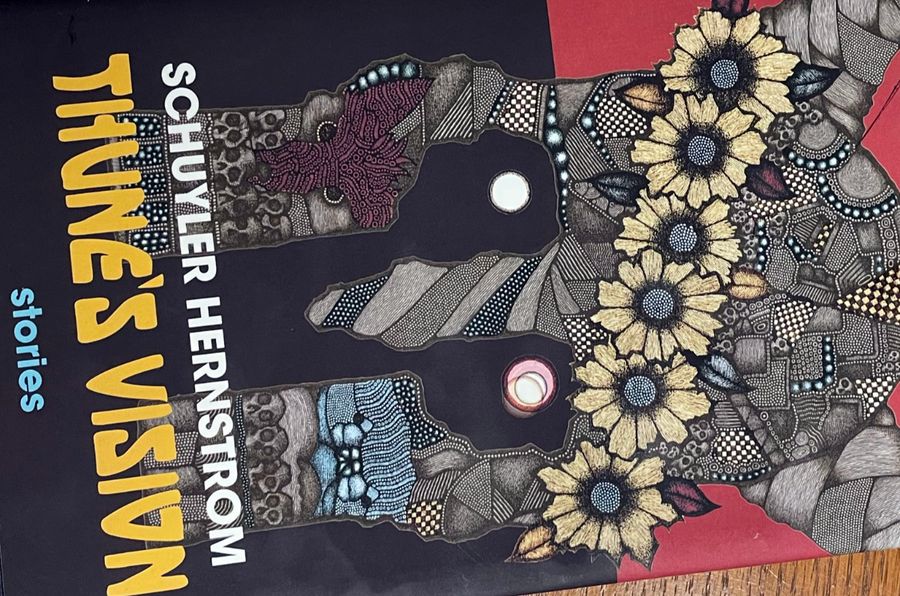I've gotten copies of Thune's Vision and Shagduk from the two respective Pilum Press Kickstarters, and oddly, it turns out you can now even order them from Target, if you really want to (please order them from Pilum, or even Amazon, but hey), and they have been worth every penny in production and quality, nevermind the storytelling.
Since I'm wrapped up in several reads at the moment, I cannot do justice to Shagduk other than to say it started well, but I had to give some time and attention to this edition of Thune.
Overall this book is a collection of short tales that straddle the line between what we now call science fiction and fantasy. The tone is often dark, and yet even the darkest events are frequently the seeds from which future hope springs. Some tales are profoundly moral, sometimes the morality is completely pagan, and others simply are. Some of what I say may be considered a spoiler, but the quality and the craft are such that they cannot be spoiled by a little foreknowledge.
The first story is The Challenger's Garland. In it, a dark and eldritch champion sets across the land to face the champion of the forces of light. He's never lost a duel, and neither has the aging champion of the kingdom opposing his lord. Who won, and who lost, is a question I'm still not sure of the answer to.
It is in Athan and the Priestess that Thune has his titular vision. In this world, long ago, sorcerers created a barrier between two forces. Since then, the cultures on each side, deprived of their opposite poles, has decayed. Athan is charged with finding a way under the barrier, and seducing the priestess. This he does, through various adventures, and eventually escapes back to his own land, to later die in battle - for it is his son that will right the wrongs.
A distant planet is the setting for The Movements of the Ige, where a life and death, war and birth are intimately intertwined for a race that worships the sun. One day, the mating battle is interrupted by an object that does not quite fall out of the sky, and one of the chiefs, curious, investigates, to find two astronauts, and a spaceship. Quick of wit, he realizes this craft can take him to the sun he worships, and embarks on a short but epic journey to meet his god.
In The Ecology of the Unicorn, a wizard, desperately searching for an answer, compels the aid of an imprisoned fairy, who plots his own vengeance.
In The Saga of Adalwolf, we get a Viking tale. Adalwolf, running from treachery with his seer of a brother at his side, is granted a boon, a magical spear, by none other than Odin. With it, he avenges the loss of his house and family - but once he sees what such power has wrought, he succumbs to the temptations of power, and wanting more.
At the start of The palace of the Androgyne, a knight finishes putting down a rebellion. He is the sole survivor, losing his lover. He goes in search of what he needs to contact his lost love, tricking a near god to get the ingredients, and likely having suffered horrifying indignities.
In Alien Mercy we are at in the modern day, at the crossroads of conspiracy theory, and wondering what is real. It is a short story, just long enough to tell the tale. No more, no less.
Finally, we have Servants of the War God, the latest and third Mortu and Kyrus story. White City was a very pragmatic-yet-moral answer to what one should do about the horrifying evil and using and abusing people for "utopia", and a stark counter to Those Who Walk Away from Omelas. The second story had the air of a Harryhausen style sword and sorcery movie, complete with giant scorpions. In this one, we meet one of the "gods" that still litter the far corners of the earth, creations of the aliens that long ago conquered earth, and were driven out by the revolt of Mortu's people. It is a tale of action and sacrifice, of both stark and subtle moral choices, where the dialogue is not just in Kyrus' incessant chatter or Mortu's directness, but in the actions taken and choices made.
Every story here has characters that come to life, taking a place in your memories, with their hopes, dreams, and despairs.
Invite them in.

